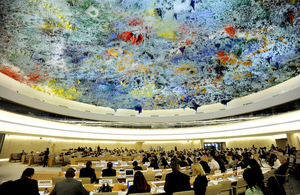UN Human Rights Council 41: explanation of vote on the right to peace
The UK explained why it called for a vote on the draft resolution and voted against it.

Thank you, Mr President,
We remain firmly of the view that “the right to peace” does not exist under international law, whether as a collective or individual human right, or otherwise. There is no support in international law for the existence of such a right. There is no internationally agreed definition of “peace”. There is no agreement on who would be the rights-bearers or the duty-bearers of such a right. The conceptual framework is weak, the scope is vast and unwieldy and enforcement is unfeasible. It runs counter to certain provisions of the UN Charter, in particular Articles 2(4) and 51. And the absence of peace cannot justify a failure to respect human rights.
Notwithstanding this clear position which we have expressed, together with others, since the establishment of the Working Group, we have consistently said that we are happy to discuss the linkages between peace and the enjoyment of human rights with a view to reaching consensus on a Draft Declaration. On that basis we had participated actively and constructively and with the utmost flexibility in the discussions in the Working Group. Despite these efforts, a consensus was not possible.
In June 2016, this Council sent a non-consensual draft Declaration to the UN General Assembly for adoption. We regretted this course of action.
We therefore call for a vote on draft resolution L.2 and shall vote against.
Thank you Mr. President.